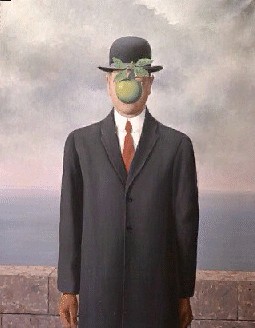
René Magritte, Le Fils de l'homme (The Son of Man), Oil on Canvas, private collection, New York, 1964

| Date |
Class Activities |
Homework Due |
| 1. W 9/3 |
Course + stud. intro.; What is the novel? Modernity In-class writing: Class? Timeline; Close Reading Exercise | Monday's reading assignment is in the cell below |
| Unit I: Modern Individuals |
||
| M 9/8 |
Review; Dostoevsky Bio, Discussion Questions, & Close Interpretation | Dostoevsky 1-64 [through Part 1, Ch. VI]; DISC. Ques. #1: Bring 3 discussion ques. to class; these will be collected (see above) |
| 3. W 9/10 |
Review; Social Utopianism and Nihilism | Dostoevsky 64-111 [through Pt. 2, Ch. III]; |
| M 9/15 |
Review;
Character Sketch |
Dostoevsky 111-65 [through Pt. 2, Ch. VII]; JOURNAL #1: bring a hard copy for the instructor and post to Blackboard/Discussion Board (see above) |
| 5. W 9/17 |
Review; Close Reading Exercise; Utilitarianism and the Woman Question | Dostoevsky 166-227 [through Pt. 3, ch. 5] |
| M 9/22 |
Party Game; Directed Questions; Journals and Def. of Close Reading | Dostoevsky 227-80 [through Pt. 4, ch. 4] |
| 7. W 9/24 |
Dostoevsky as Drama | Dostoevsky 280-330 [through Pt. 5, ch. 2]; DISC. #2 |
| M 9/29 |
Review; Keywords in C&P; Vocab.; My Modernism assigned | Dostoevsky 330-90 [through Pt. 6, ch. 2] |
| 9. W 10/1 |
Review; Raskolnikov on Trial | Dostoevsky 390-65 [finish]; JOURNAL #2: bring a hard copy for the instructor and post to Blackboard/Discussion Board (see above) |
| M 10/6 |
Hermann Hesse; Realism | Hesse 1-66; DISC. #3 |
| 11. W 10/8 |
Review; Suicide; Modernism; Dada, Surrealism, and Existentialism | Hesse 66-102 |
| M 10/13 |
Review; Images from the novel; Who are Hermine and Pablo?; Structural elements in Steppenwolf; War?; Dancing and Sexuality | Hesse 102-58; JOURNAL #3: bring a hard copy for the instructor and post to Blackboard/Discussion Board (see above) |
| 13. W 10/15 |
Names; Group Discussion: Immortals, Mozart, and the Magic Theater | Hesse 158-end |
| M 10/20 |
End of novel; Midterm Review |
Bring Dostoevsky and Hesse to
class; prepare notes for exam ques. |
| 15. W 10/22 |
Midterm--No make-up dates--Be there or be out of luck! | Study for midterm; Bring books (open-book exam) |
| Unit II: Experimental Voices |
||
| M 10/27 |
Kafka's The Trial | Kafka 1-79; DISC. #4 |
| 17. W 10/29 |
NEW: Reserach for My
Modernism: Meet in Sprague Lib.
Rm. 203 |
Kafka 80-110 |
| M 11/3 |
Review; Authority and Gender in Kafka | Kafka 111-65 |
| 19. W 11/5 |
Review; Kafka's The Trial | Kafka 165-98; JOURNAL #4: bring a hard copy for the instructor and post to Blackboard/Discussion Board (see above) |
| M 11/10 |
Kafka's The Trial; Breton Bio; Surrealism and Breton; Surrealist Manifesto; Second Manifesto; Ques. about Manifesto | Kafka 199-266; Read the Surrealist Manifesto and skim the Second Manifesto |
| 21. W 11/12 |
Writing Workshop--Meet in DI 280 @ 11:40 |
Rough Draft of My Modernism due |
| M 11/17 |
Research Report: My Modernism discussion | Hard copy of My Modernism due; Bring cue cards and/or visuals to present research |
| 23. W 11/19 |
Surrealism; Breton's Nadja; Translations | Breton 1-94; DISC. #5 |
| M 11/24 |
Review of last week; Breton's Nadja | Breton 94-160; |
| 25. W 11/26 |
Review; Kundera and the Novel: Biography and Existential Codes | Kundera
1-78; JOURNAL #5: On either Breton or
Kundera |
| M 12/1 |
Timeline; Prague Spring; Your Questions; Love, Death, and Kundera; Socialist Realism | Kundera 81-171; DISC. #6 |
| 27. W 12/3 |
Unbearable, Oedipus, and Narration | Kundera 175-240 |
| M 12/8 |
Free Write: ULB?; Final assigned; Course summation | Kundera 243 - end; Journal Portfolio due; Optional: Staple/clip old and/or new discussion questions and submit (separately from the Journal Portfolio) as a Participation Packet |
| Finals week |
In-class Final Exam M 12/15 1-3pm |
Study for final exam; Bring books (open-book exam) |